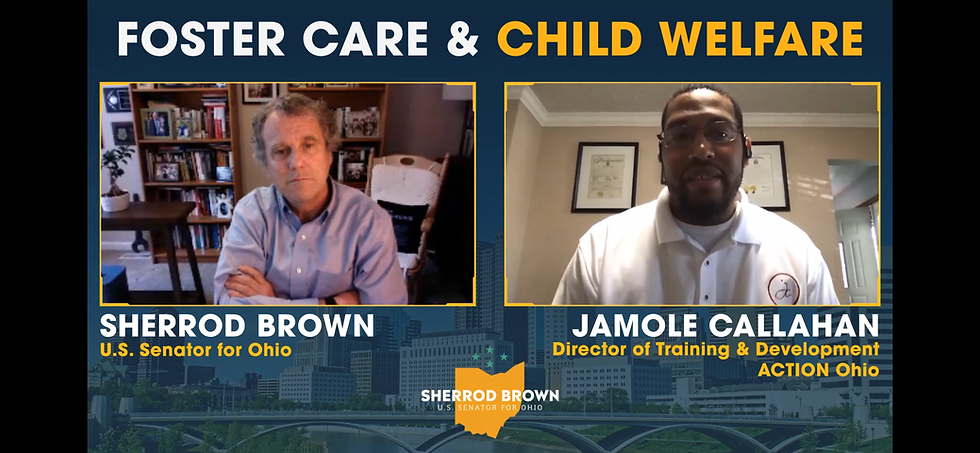The Ohio Children's Alliance applauds Senator Sherrod Brown's efforts to help child welfare agencies during the COVID-19 pandemic. Recently, he introduced the “Child Welfare Emergency Assistance Act” to provide funding for key programs to support youth and families.
The impact of business and school closure and social distancing are putting stress on families attempting to navigate health and safety protocols, home-schooling, uncertain childcare arrangements, and job losses. Meanwhile, many families and foster were already struggling with behavioral health and other health and social challenges.
Senator Brown understands how hard our state's child welfare system and as well as many others have been hit by the devastating affects of the pandemic and wants to address the needs of vulnerable children and families before it is too late.

Jamole Callahan, a former foster youth who is now the Director of Training and Development of ACTION Ohio and one of our Bridges Community Collaboration Coordinator, was recently able to sit down with the Senator and praised the legislation for taking the voices of current and former foster youth into account.
“I’m so grateful that Sen. Brown listened to the voices of current and former foster youth in crafting the Child Welfare Emergency Assistance Act. He has tapped and increased existing federal programs to give us a platform to rebuild our lives and get the skills we need to contribute to the rebuilding of this nation as we all recover from this tumultuous time,” said Mr. Callahan.
Specifically, the legislation will invest in the health, safety, and wellbeing of children, youth, and families by:
Investing $2 billion to support state and tribal child welfare agencies in providing families, kinship caregivers, and young people with a broad range of support services
Providing $30 million for kinship navigator programs to ensure kinship caregivers have access to information and resources
Dedicating $50 million to help states implement health oversight and coordination plans
Investing $15 million in states and tribes for training on trauma-informed de-escalation strategies
Requiring states to develop and implement de-escalation strategies
Expediting eligibility for children living with a relative in foster care for federal support
Providing $500 million for the John H. Chafee Foster Care Independence Program to ensure young people have access to supports
Establishing a moratorium on “aging out” of foster
The legislation will also increase support for services to prevent foster care and the ability of courts to serve families by:
Increasing federal support to provide Title IV-E prevention services
Providing $30 million for the Court Improvement Program
We urge you to call your Senator today and request that they support this important legislation.


Opmerkingen